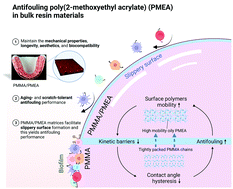Molecular weight tuning optimizes poly(2-methoxyethyl acrylate) dispersion to enhance the aging resistance and anti-fouling behavior of denture base resin†
Abstract
Poly(methyl methacrylate) (PMMA)-based denture base resins easily develop oral bacterial and fungal biofilms, which may constitute a significant health risk. Conventional bacterial-resistant additives and coatings often cause undesirable changes in the resin. Reduced bacterial resistance over time in the harsh oral environment is a major challenge in resin development. Poly(2-methoxyethyl acrylate) (PMEA) has anti-fouling properties; however, due to the oily/rubbery state of this polymer, and its surface aggregation tendency in a resin mixture, its direct use as a resin additive is limited. This study aimed to optimize the use of PMEA in dental resins. Acrylic resins containing a series of PMEA polymers with various molecular weights (MWs) at different concentrations were prepared, and the mechanical properties, surface gloss, direct transmittance, and cytotoxicity were evaluated, along with the distribution of PMEA in the resin. Resins with low-MW PMEA (2000 g mol−1) (PMEA-1) at low concentrations satisfied the clinical requirements for denture resins, and the PMEA was homogeneously distributed. The anti-fouling performance of the resin was evaluated for protein adsorption, bacterial and fungal attachment, and saliva-derived biofilm formation. The PMEA-1 resin most effectively inhibited biofilm formation (∼50% reduction in biofilm mass and thickness compared to those of the control). Post-aged resins maintained their mechanical properties and anti-fouling activity, and polished surfaces had the same anti-biofilm behavior. Based on wettability and tribological results, we propose that the PMEA additive creates a non-stick surface to inhibit biofilm formation. This study demonstrated that PMEA additives can provide a stable and biocompatible anti-fouling surface, without sacrificing the mechanical properties and aesthetics of denture resins.



 Please wait while we load your content...
Please wait while we load your content...